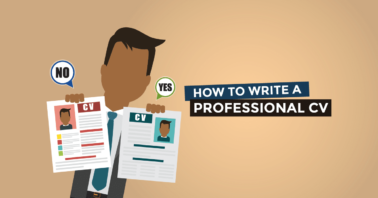You aren’t going to get that promotion.
You don’t have any real skills.
No one is going to hire you for that.
Do any of these thoughts sound familiar? Are you not asking for the raises, promotions, or career opportunities you want because you don’t think you could get them? Or worse, because don’t think you deserve them?

You’re not alone, but—more importantly— understanding why you feel that way helps you focus on making a change (for the better!).
From experience, career confidence is based on three key things:
Your comfort in any given situation
Your understanding of your strengths and talents
The little voices in your head and your ability not to listen to them
Here are three questions to ask yourself—and how to use them to boost your confidence at work.
Question #1: How Comfortable Are You in Your Job Right Now?
Think about it: When you’re uncomfortable in what you do or where you are, you can feel it—it impacts your body language, your conversations, and your interactions with others. Not exactly a breeding ground for confidence, right? On the other hand, when you know how you fit into a situation and how everything works, you’re comfortable, you can relax a bit, and you’re bound to feel more self-assured.
So, take a moment, do an assessment: Are you comfortable in what you’re doing? Are you feeling relaxed in your office (or in your job search?). Or, are you often in new situations or scenarios that stress you out and make you feel constantly on edge? If it’s the latter, it’s probably impacting your confidence.
Here’s What You’ll Do
If you work in a place where you never feel like you have the chance to get comfortable, take a second and write down three things that would make you feel better. Things like developing a morning routine that relaxes you, making your workspace your own, or talking to your boss about giving you more structure can go a long way toward building up your comfort level.
If you’re job searching or doing some personal development, what one thing can you do to increase your sense of comfort? Read up on interviews before attending one. Learn a new technique that you are about to invest in? What is your biggest source of stress right now, and how can you alleviate it?
Question #2: How Good Are You at What You Do?
Confidence increases when you do work that is easy for you and makes you feel good. On the flip side, when you do work that’s a mismatch (being an admin when you suck at organisation, for example), your confidence can take a hit.
Take a second and assess what you are good at and what feels good to you. Then, start to do more of that.
Here’s What You’ll Do
Step 1: Write down all the tasks or activities that come easily to you in your current work (or past jobs). This can be anything from dealing with unhappy clients to building amazing PowerPoint slides to crafting witty web copy.
Then, take a look at that list and circle the things that you actually like to do—the ones that make you feel good and that you actually enjoy doing. (If you’re great at logistics but hate it, for example, you’re forbidden to circle it.)
Step 2: Ask one or two people you trust and respect what they think you are amazing at. Write their feedback down.
Step 3: Take a look at your last performance review, and figure out what you like about what your boss said about you—in other words, what you want to own as a strength.
Now, look at that list. First, take a moment and appreciate all you do have to offer. You’ve got mad skills! You see it, your friends see it, and even your boss sees it.
Then, think about how you might shift your workload so that you’re able to do more of what makes you feel good. If it’s writing, for example—could you offer to rewrite your department’s FAQs or draft a post for the company blog? Even a small shift here can make a huge difference in your confidence (not to mention happiness).
Question #3: What’s Going on Inside Your Head?
“I’m a fraud.” “I’m not an expert.” “I have nothing to offer.” These thoughts not only drag your confidence down, they can have a direct impact on your career. After all, if you don’t believe in yourself, it’s pretty hard to get others to believe in you.
But if you can find ways to squelch these thoughts and be nicer to yourself, you’ll start to gain the confidence you need to get ahead.
Here’s What You’ll Do
When you have one of these negative thoughts, try to catch yourself. Take a second, take a deep breath, and let the thought pass. It’s just a thought; it’s not who you are. You can also think of a time when you felt really good about who you are and what you’re doing, and hold that in your mind. Review your list of strengths if that gives you the reminder that you need.
Finally, remember that everyone on Earth has felt this way at some point, and so you have a choice: continue to be hard on yourself, or let it go and focus on what you can do moving forward.
Boosting your confidence isn’t a quick fix. But helping yourself get more comfortable, identifying and focusing on your strengths, and tempering your negative thoughts can all go a long way to remind you that you have everything you need to create the career of your dreams.




